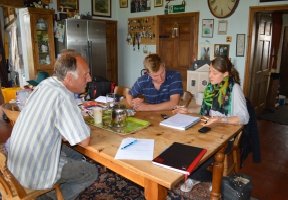This week, the European Commission has published a report that was led by Janet Dwyer, Nenia Micha and Katarina Kubinakova from CCRI. With support from the Austrian Institute for Regional Studies (OIR) and Analysis for Economic Decisions (ADE S.A.) in Belgium, as well as experts in Italy (CREA), Estonia (CEET), Hungary (IKA) and Poland (IRWIRPAN), the report aimed to assess how different Common Agricultural Policy (CAP) measures and instruments affect generational renewal (GR) in rural areas, with a secondary focus on rural jobs.
The report responds to a legal requirement on the European Commission to independently assess how far the CAP – its second-largest spending policy area – is meeting the EU’s strategic objectives. In agriculture, farmers’ organisations and other rural groups have voiced increasing concern about a shortage of young people going into farming, and a diminishing share of young people in rural communities, with long-term detrimental impacts on rural vitality and countryside management. The study aimed to see how far the CAP is helping to address these concerns.
The research team took a mixed-method approach to their work, which consisted of five elements.
- EU Level informed opinion – literature review; stakeholder interviews; online survey
- EU level data analysis – correlation analysis; econometric multicriteria analysis; typology generation at NUTS 3 level
- Case-based detailed analysis – covering seven contrasting Member States
- Additional quantitative analysis – counterfactual analysis of Farm Accountancy Data Network data in France and Italy
- Triangulation and validation – comparative analysis of case study findings; seven national level workshops; three EU level workshops
The research team found that ‘the CAP as a whole has a positive effect in fostering generational renewal, particularly in agriculture’. In some Member States the effect was ‘significant’ whereas in others it was ‘weakly effective’ and the factors that determined this were a ‘combination of the underlying socio-economic and cultural context…CAP instrument selection and measure design, as well as delivery choices and provision’. The study concluded that CAP support for young farmers worked best when offered as a package with training and advice, tailored to local conditions. It recommended a stronger focus on help for new entrants in future; and broader investment in rural economic diversification and basic services, including ICT, in the most remote and disadvantaged territories, to complement local efforts to retain young farmers.

The main messages from the report will influence the current debates about the new CAP after 2020; its priorities and its funding, which in turn will shape the legislation finalising details of the policy for 2021-2028. The Commission can draw upon its findings to help draft regulations and guidance which should improve its ability to foster generational renewal across the EU.
The final report and its executive summary can be downloaded from the European Commission website.
- Evaluation of the impact of the CAP on generational renewal, local development and jobs in rural areas – Final Report
- Evaluation of the impact of the CAP on generational renewal, local development and jobs in rural areas – Executive Summary
The final report has also been added to the University of Gloucestershire’s Research Repository.




